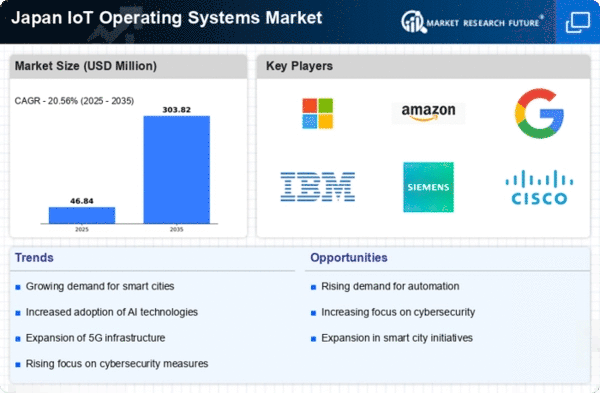Emergence of 5G Technology
The rollout of 5G technology in Japan is poised to have a transformative impact on the iot operating-systems market. With its high-speed connectivity and low latency, 5G enables a new wave of applications that require real-time data processing and communication. This technological advancement is likely to enhance the capabilities of iot devices, necessitating the development of sophisticated operating systems that can leverage these features. As 5G networks become more widespread, it is anticipated that the number of connected devices will increase exponentially, further driving the demand for efficient iot operating-systems. Companies are expected to invest heavily in research and development to create systems that can fully utilize the potential of 5G, thereby fostering innovation within the market.
Growing Adoption of Smart Devices
The proliferation of smart devices in Japan is a primary driver for the iot operating-systems market. As consumers increasingly embrace smart home technologies, wearables, and connected appliances, the demand for robust operating systems that can manage these devices effectively rises. In 2025, it is estimated that the number of connected devices in Japan will exceed 1 billion, creating a substantial need for efficient iot operating-systems. This surge in device adoption necessitates operating systems that can ensure seamless connectivity, interoperability, and user experience. Consequently, manufacturers are investing in developing advanced iot operating-systems that can cater to diverse applications, thereby propelling market growth. The integration of artificial intelligence and machine learning into these systems further enhances their capabilities, making them more appealing to both consumers and businesses alike.
Focus on Data Security and Privacy
As the iot operating-systems market continues to expand, concerns regarding data security and privacy are becoming increasingly prominent in Japan. With the rise of connected devices, the potential for data breaches and cyber threats poses significant challenges. Consequently, there is a growing emphasis on developing operating systems that incorporate robust security measures to protect sensitive information. In 2025, it is estimated that the global cost of cybercrime will reach $10 trillion, underscoring the urgency for secure iot operating-systems. Companies are investing in advanced encryption techniques, secure communication protocols, and regular software updates to mitigate risks. This heightened focus on security not only addresses consumer concerns but also enhances the overall credibility of the iot operating-systems market, potentially leading to increased adoption.
Government Initiatives and Support
The Japanese government plays a crucial role in fostering the growth of the iot operating-systems market through various initiatives and support programs. Policies aimed at promoting digital transformation and smart city projects are driving investments in iot technologies. For instance, the government has allocated approximately $1 billion for the development of smart infrastructure, which includes the implementation of advanced iot operating-systems. This financial backing encourages companies to innovate and develop new solutions that align with national objectives. Furthermore, regulatory frameworks are being established to ensure data security and privacy, which are essential for the widespread adoption of iot technologies. As a result, the supportive environment created by the government is likely to stimulate the growth of the IoT Operating Systems Market in Japan.
Rising Demand for Automation in Industries
The increasing demand for automation across various industries in Japan is significantly influencing the iot operating-systems market. Sectors such as manufacturing, logistics, and agriculture are increasingly adopting iot solutions to enhance operational efficiency and reduce costs. In 2025, it is projected that the industrial automation market in Japan will reach approximately $50 billion, driving the need for specialized iot operating-systems that can support complex industrial applications. These systems must be capable of handling large volumes of data and providing real-time analytics to facilitate decision-making. As industries seek to optimize their processes through automation, the demand for advanced iot operating-systems that can integrate with existing infrastructure is expected to grow, thereby propelling market expansion.

















